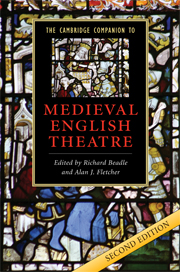Book contents
- Frontmatter
- 1 An introduction to medieval English theatre
- 2 The theatricality of medieval English plays
- 3 The cultural work of early drama
- 4 The York Corpus Christi Play
- 5 The Chester cycle
- 6 The Towneley pageants
- 7 The N-Town plays
- 8 The non-cycle plays and the East Anglian tradition
- 9 Morality plays
- 10 Saints and miracles
- 11 Modern productions of medieval English drama
- 12 A guide to criticism of medieval English theatre
- Select bibliography
- Author index to the bibliography
- General index
11 - Modern productions of medieval English drama
Published online by Cambridge University Press: 28 November 2011
- Frontmatter
- 1 An introduction to medieval English theatre
- 2 The theatricality of medieval English plays
- 3 The cultural work of early drama
- 4 The York Corpus Christi Play
- 5 The Chester cycle
- 6 The Towneley pageants
- 7 The N-Town plays
- 8 The non-cycle plays and the East Anglian tradition
- 9 Morality plays
- 10 Saints and miracles
- 11 Modern productions of medieval English drama
- 12 A guide to criticism of medieval English theatre
- Select bibliography
- Author index to the bibliography
- General index
Summary
Medieval theatre is unlike the English drama of any later period in that it lacks a continuous or nearly continuous tradition of performance. All modern productions of medieval plays are (or should be) experimental, therefore, either in attempting to rediscover the original staging and production methods of the play one is producing, or in trying to find modern ‘equivalents’ to those methods.
Beginnings
After performance of plays on traditional religious subjects was forbidden by Queen Elizabeth I's Privy Council, attempts at revival gradually became impossible, even in remote areas. Increasing censorship, combined in some areas with puritan prejudice against drama of any sort, tended towards confining the theatre to the few professional companies who enjoyed royal protection, so that large-scale amateur productions of non-cycle plays also ceased to be possible, although some morality plays performed by professionals survived until Shakespeare's time. Thus began a long eclipse which did not end until about 1900, when antiquarian interest and scholarly curiosity about ‘pre-Shakespearean’ drama led to a few revivals. Even so, most early scholars studying medieval drama had probably never seen a performance of any medieval English play.
- Type
- Chapter
- Information
- The Cambridge Companion to Medieval English Theatre , pp. 287 - 325Publisher: Cambridge University PressPrint publication year: 2008

